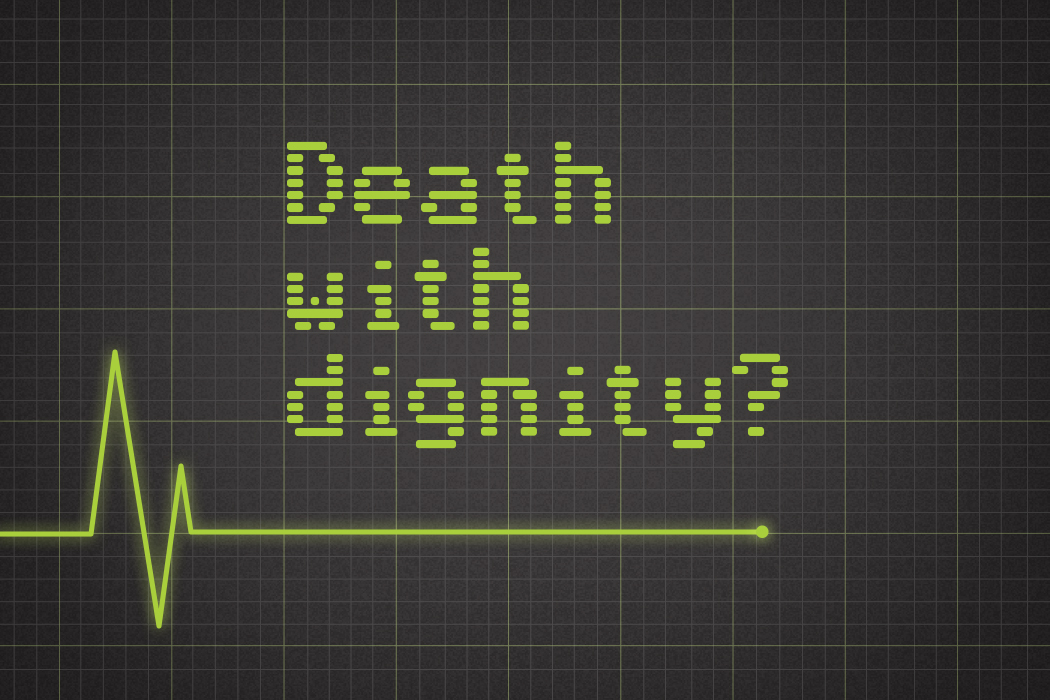
Illustration: Kaitlin O'Toole
‘Death with dignity’ has become a global euphemism
Should we have the right to die? That will be debated at the next Visionary Conversations on April 30.
Harvey Max Chochinov, Canada Research Chair in Palliative Care, in the Faculty of Medicine will be one of the speakers, and in July of last year he wrote an essay for the journal Nature on this topic. He is a Distinguished Professor of Psychiatry at the U of M and Director of the Manitoba Palliative Care Research Unit, CancerCare Manitoba.
Here are some of his thoughts from his July 2013 essay.
Secobarbital in Seattle — why lose sleep?
About 2 years ago, the Seattle Cancer Care Alliance (SCCA) added physician-assisted suicide to their list of offerings for terminally ill patients thought to be within 6 months of death. A recent publication in the New England Journal of Medicine describes how this service, sanctioned under the Washington Death with Dignity Act, has turned out. Although the report includes all the expected metrics—how many people inquired into the Death with Dignity Program, how many received a lethal prescription of secobarbital, how many died as a result of said prescription—the authors’ take-home message is that the programme has been well accepted by patients and clinicians, and that the business of medicine at SCCA goes on as usual. So, why lose sleep?
According to Greek mythology, a Chimera was a monstrous fire-breathing creature, usually depicted as a lion, with the head of a goat arising from its back and a tail that ended in a snake’s head. Describing such a creature depends completely on where one stands; based on their vantage point, observers might conceivably recount accurate and yet entirely contradictory images. Clearly, the issue of physician-assisted suicide and euthanasia is a modern day Chimera, and it remains amongst the most polarizing and contentious issues in all of medicine. Legions of opponents and proponents have waged battle, armed with powerful and seemingly convincing arguments: autonomy, the sanctity of life, the right to die, the slippery slope, the imperative of palliative care, the integrity of medicine as we know it and, lest we forget, dignity….
That these measures are so universally affiliated with the language of dignity is surely an indictment of the culture of medicine, which largely ignores death and tends to abandon patients when cure is no longer viable.
 ‘Death with dignity’ has become a global euphemism for physician-assisted suicide and euthanasia. That these measures are so universally affiliated with the language of dignity is surely an indictment of the culture of medicine, which largely ignores death and tends to abandon patients when cure is no longer viable. This culture of medicine often fails to deliver adequate relief from pain and distress associated with terminal illness, despite there being effective means to do so (it is worse for dying children than adults; worse for the frail elderly and cognitively impaired; worse for people who are poor, members of ethnic minorities or the disabled; worse for people with non-cancer-related fatal illnesses; and worse for people living in rural or remote regions). When lethal prescriptions and fatal injections are hailed as ‘death with dignity’, it underscores how few expectations patients have of medicine, and its ability to offer effective, humane alternatives.
‘Death with dignity’ has become a global euphemism for physician-assisted suicide and euthanasia. That these measures are so universally affiliated with the language of dignity is surely an indictment of the culture of medicine, which largely ignores death and tends to abandon patients when cure is no longer viable. This culture of medicine often fails to deliver adequate relief from pain and distress associated with terminal illness, despite there being effective means to do so (it is worse for dying children than adults; worse for the frail elderly and cognitively impaired; worse for people who are poor, members of ethnic minorities or the disabled; worse for people with non-cancer-related fatal illnesses; and worse for people living in rural or remote regions). When lethal prescriptions and fatal injections are hailed as ‘death with dignity’, it underscores how few expectations patients have of medicine, and its ability to offer effective, humane alternatives.
Dignity conserving palliative care requires thoughtful attention to patients’ physical, psychological, existential and spiritual dimensions of suffering. It requires that personhood not be overshadowed by patienthood. When our research group published a dignity-conserving approach to end of life care, Faye Girth, the executive director of the Hemlock Society USA (which was a national right-to-die organization) conceded “if most individuals with terminal illness were treated this way, the incentive to end their lives would be greatly reduced”. To be clear, palliative care should no more be seen as the perfect foil to suffering, than medicine should be pitched as the perfect foil to death. There will always be a tiny minority of patients who, in spite of the best care possible, will want to control the timing and circumstances of their death; and will want the law of the land changed so as to entitle them to have their physicians help them do so. One thing is for certain—this Chimera will not be easily slain.
Reprinted by permission from Macmillan Publishers Ltd: Nature Reviews Clinical Oncology (3323131350134), 2013.
Research at the University of Manitoba is partially supported by funding from the Government of Canada Research Support Fund.







